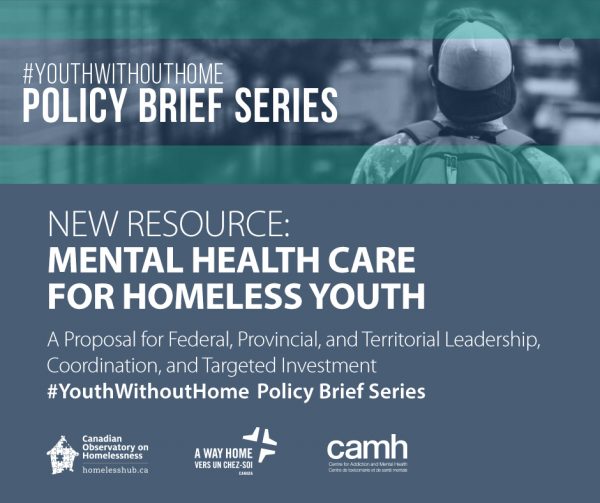Government strategy on youth homelessness must focus on mental health needs, report says
TORONTO, April 6, 2017 – Governments must focus on the mental health challenges faced by young people in Canada in order to effectively address youth homelessness, says a policy brief released today by researchers and community groups.
The report by the Canadian Observatory on Homelessness, based at York University, and A Way Home Canada, calls on federal, provincial and territorial governments to implement youth homelessness strategies that recognize marginalized and homeless youth are at higher risk of mental health challenges, poor quality of life, and suicide. The first national study on youth homelessness found that 85 per cent of young Canadians who are homeless are experiencing a mental health crisis, 42 per cent reported at least one suicide attempt, and 35 per cent reported at least one drug overdose requiring hospitalization.
“Rather than invest in prevention and rapid re-housing, our response to youth homelessness has been to wait until young people face acute crises before we do something. It is time to change our approach,” said Stephen Gaetz, York University Professor and Director of the Canadian Observatory on Homelessness. “This is an opportunity for the Canadian government to become an international leader in addressing youth homelessness.”
 Adverse childhood experiences such as abuse, systemic problems including barriers to accessing services, and structural issues such as racism often combine to worsen the mental health of youth experiencing homelessness. LGBTQ2S and Indigenous youth experiencing homelessness report markedly poorer mental health and face numerous barriers to accessing supports.
Adverse childhood experiences such as abuse, systemic problems including barriers to accessing services, and structural issues such as racism often combine to worsen the mental health of youth experiencing homelessness. LGBTQ2S and Indigenous youth experiencing homelessness report markedly poorer mental health and face numerous barriers to accessing supports.
“Youth homelessness is an equity issue. All youth, regardless of their identity or poverty, deserve access to safe, affordable, and appropriate housing and health care. These are human rights, said Kaitlin Schwan, Postdoctoral Fellow at the Canadian Observatory on Homelessness. “The fact that Indigenous youth across Canada disproportionately experience homelessness and poor mental health demands an urgent response from all levels of government.”
Federal and provincial governments have made significant investments in homelessness and mental health recently. The federal government announced a 10-year, $5 billion dollar investment in mental health services earlier this year and most provinces and territories have now established new mental health transfers with Ottawa. The policy brief calls on the federal government to implement a youth homelessness strategy with a special focus on mental health and wellness, and for provincial and territorial governments to implement more targeted strategies.
“With this new federal investment in mental health, communities across Canada are positioned to make real progress on this issue. The key will be ensuring services are coordinated and communities set real, measurable targets for progress,” said Melanie Redman, Executive Director of A Way Home Canada.
The policy brief outlines six recommendations for federal, provincial, and territorial governments:
- Develop and implement strategies to prevent and end youth homelessness, supported by targeted investments;
- Invest in systems integration to address the mental health needs of youth experiencing homelessness;
- Prioritize and invest in program models that focus on prevention and rapid exits from homelessness for youth;
- Adopt a youth-centered approach to addressing youth homelessness, grounded in human rights;
- Ensure that all strategies and program responses address the unique needs of diverse youth experiencing homelessness; and
- Develop a national research strategy focused on youth homelessness, and invest in knowledge development and data management, in order to advance an integrated systems response to youth homelessness.
The Canadian Observatory on Homelessness is a non-profit, non-partisan research institute that is committed to conducting and mobilizing research so as to contribute to real and sustainable solutions to homelessness.
A Way Home Canada is a national coalition dedicated to preventing and ending youth homelessness in Canada. We inspire and enable communities and all levels of government to organize, plan and implement strategies to address youth homelessness in a coordinated, measurable and impactful way.
York University is known for championing new ways of thinking that drive teaching and research excellence. Our students receive the education they need to create big ideas that make an impact on the world. Meaningful and sometimes unexpected careers result from cross-discipline programming, innovative course design and diverse experiential learning opportunities. York students and graduates push limits, achieve goals and find solutions to the world’s most pressing social challenges, empowered by a strong community that opens minds. York U is an internationally recognized research university – our 11 faculties and 26 research centres have partnerships with 200+ leading universities worldwide. Located in Toronto, York is the third largest university in Canada, with a strong community of 53,000 students, 7,000 faculty and administrative staff, and more than 295,000 alumni. York U's fully bilingual Glendon campus is home to Southern Ontario's Centre of Excellence for French Language and Bilingual Postsecondary Education.
Media Contact:
Janice Walls, Media Relations, York University, 416-455-4710, wallsj@yorku.ca






